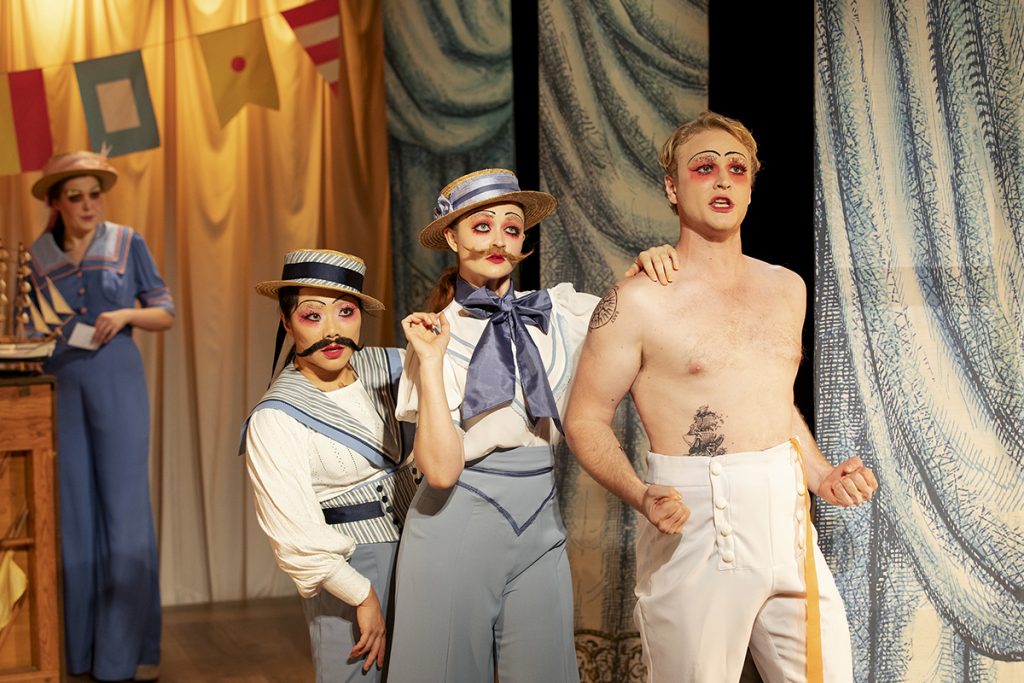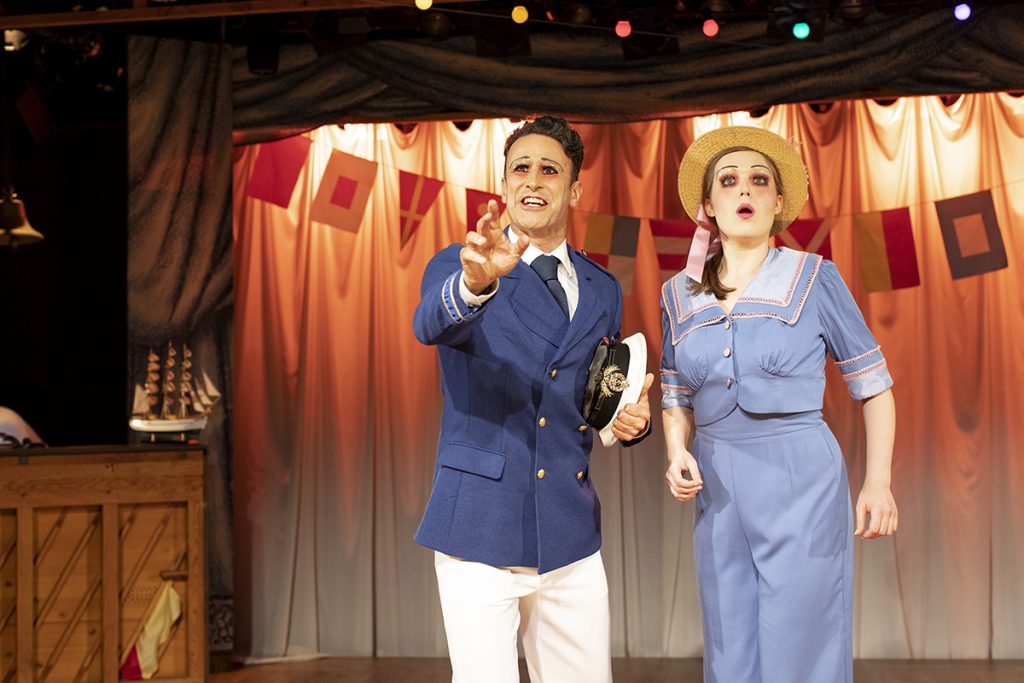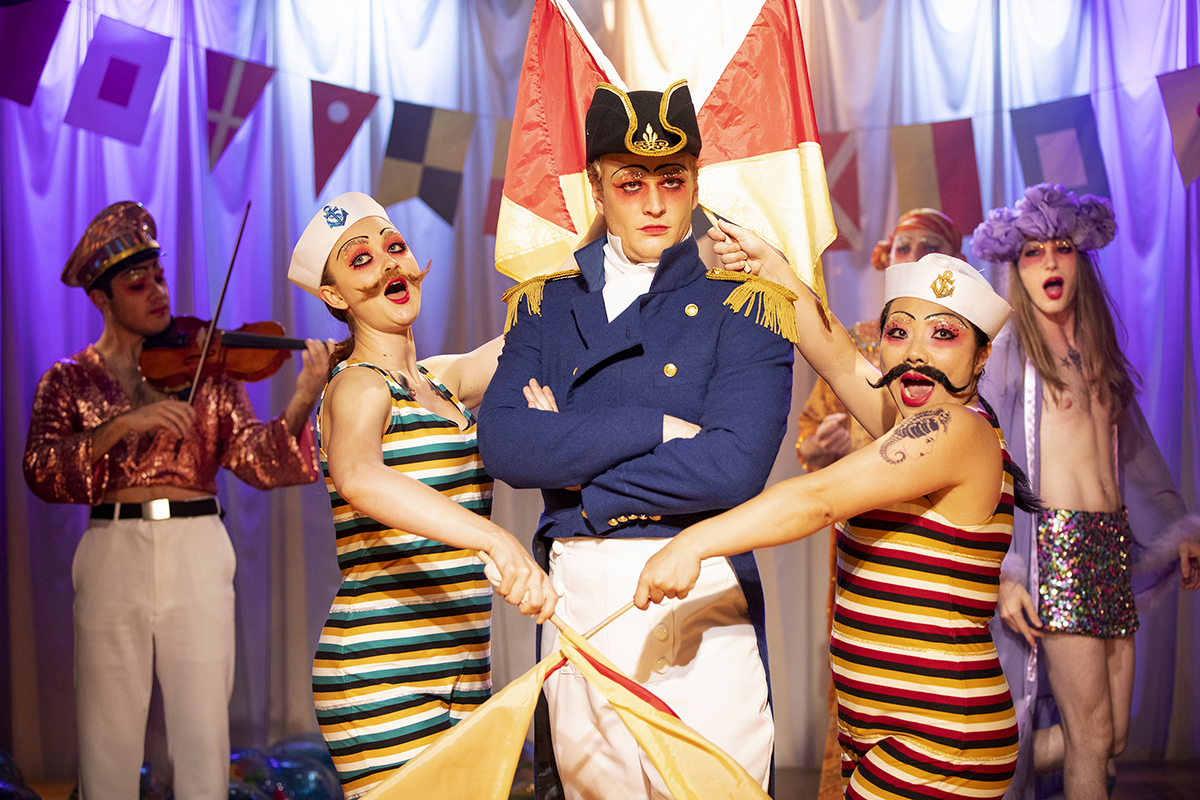You might think of Gilbert and Sullivan as a little camp.
But the Hayes dialled it up a notch or two to make their current production of H.M.S. Pinafore camper than camp. And I, for one, loved it.
With hardly a word changed in the lyrics, the campness has truly transversed the centuries almost intact.
Gender fluidity is a big feature of the casting – from Thomas Campbell as Little Buttercup (I’m called Little Buttercup, dear Little Buttercup, Though I could never tell why. But still I’m called Buttercup, Poor Little Buttercup, Sweet Little Buttercup, I) and Bille Palin as Ralph Rackstraw to the ensemble’s boatswains. It is the Hayes at its creative best – bringing together musicians and opera singers who exude talent as musicians swap between the piano to the clarinet and piano accordion, and the ensemble switches from singing and dancing to playing the cello, violin and guitar.
Our first glimpse of Campbell as Buttercup confirms that this is not going to be an ordinary adaptation.
The costumes are wonderfully bold and flamboyant, ranging from 1920s and 1930s beach and loungewear ensembles to 1980s risque nightclub numbers adorned with sequins, turbans, tutus, flags (lots them), a couple of very impressive moustaches, and a cast with very distracting and glamorous sequinned eyebrows. There is much to behold in sight and song.
A 110-seat theatre, the Hayes always impresses with the creativity of sets and choreography and use of the small stage. H.M.S. Pinafore starts the overture and the ensemble singing, playing instruments and setting the standard of the show to come. To set the scene, the action begins with a large sheet featuring a model sailing ship atop the waves featuring the sounds of the ocean that fills the room. Next, a ship is crashing on the waves.

HMS Pinafore. Hayes Theatre Co. Image via Phil Erbacker. Image supplied.
There are beach ball props and an abundance of flags, but very little else is needed to transport the audience into the world of Pinafore.
Never Mind the Why and Wherefore, sung superbly by Tobias Cole is one of the operetta’s most famous numbers with the witty lyrics: “I am the captain of the pinafore, though related to a peer, I can hand, reef, and steer, and ship a selvagee; I am never known to quail at the fury of a gale, and I’m never, never sick at sea!
What, never?
No, never!
What, never?
Hardly ever!”
The witty refrain has been mimicked time and time again through British comedy and that dry humour is sustained through the production.
Other popular numbers are I am the monarch of the sea, sung by Sir Joseph and the two women “and we are his sisters, and his cousins, and his aunts!”
Parodying the love that is societally forbidden between the captain’s daughter and a simple boatswain, this production has used the gender parallels as the love transcending boundaries. It’s cleverly done through clever and entertaining gender-fluid casting.
Personally, the appeal of the incredible ineptitude of those placed in positions of power is such a timeless parody by Gilbert and Sullivan – and his lyrics for Sir Joseph Porter in When I was a Lad are as poignant today as they were 150 years ago.
“Of legal knowledge I acquired such a grip That they took me into the partnership.
And that junior partnership, I ween, Was the only ship that I ever had seen.
… if you want to rise to the top of the tree, If your soul isn’t fettered to an office stool,
Be careful to be guided by this golden rule.…Stick close to your desks and never go to sea,
And you all may be rulers of the Queen’s Navee!”
And how perfectly is a politician captured by the following lyrics, “I always voted at my party’s call, and I never thought of thinking for myself at all? (He never thought of thinking for himself at all.)
I thought so little, they rewarded me by making me the Ruler of the Queen’s Navee!”
Gilbert and Sullivan’s comic opera Pinafore was first performed in 1878 and was one of their most popular works, running for 571 performances. It was their fourth collaboration and first international success.
WS Gilbert’s lyrics pointedly ridicule the British class system and focus on love crossing these boundaries. The captain’s daughter, Josephine, is in love with a common sailor Ralph Rackstraw but she is being pursued by Sir Joseph Porter, First Lord of the Admiralty. While Ralph is a mere boatswain he is a solid naval man while, Sir Joseph is a fool who has risen through no merit of his own, just an accident of birth.
Playing the captain’s daughter Josephine, Katherine Allen has a beautiful soprano voice which is perfect for this operetta. Seen last year in the Sydney Philharmonic Choir’s Candide as Paquette, Allen has the light touch needed in the comic opera.

HMS Pinafore. Hayes Theatre Co. Image via Phil Erbacker. Image supplied.
Bonnie-Jean Henning and Jermaine Chau also have strong voices for operetta and I look forward to hearing more of Chau’s beautiful voice.
Other standouts in the cast are Gavin Brown, in the ensemble, and Thomas Campbell (Buttercup).


